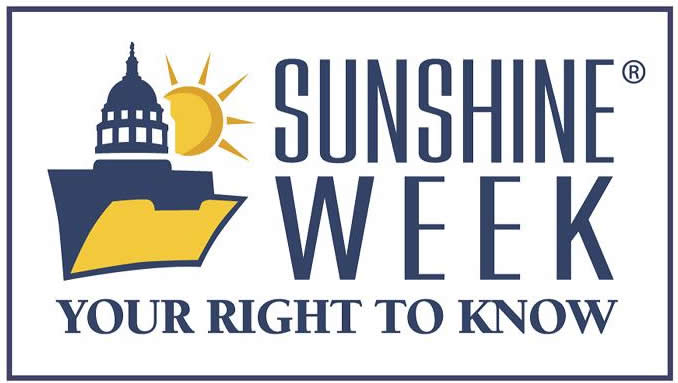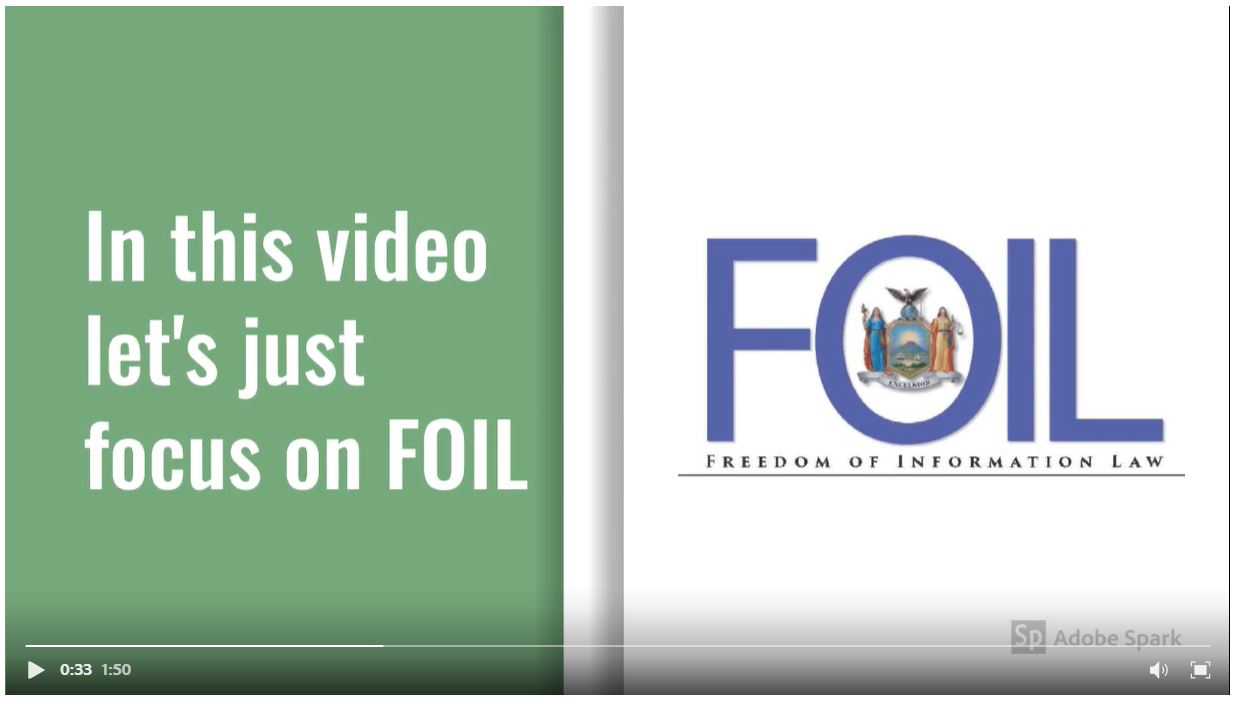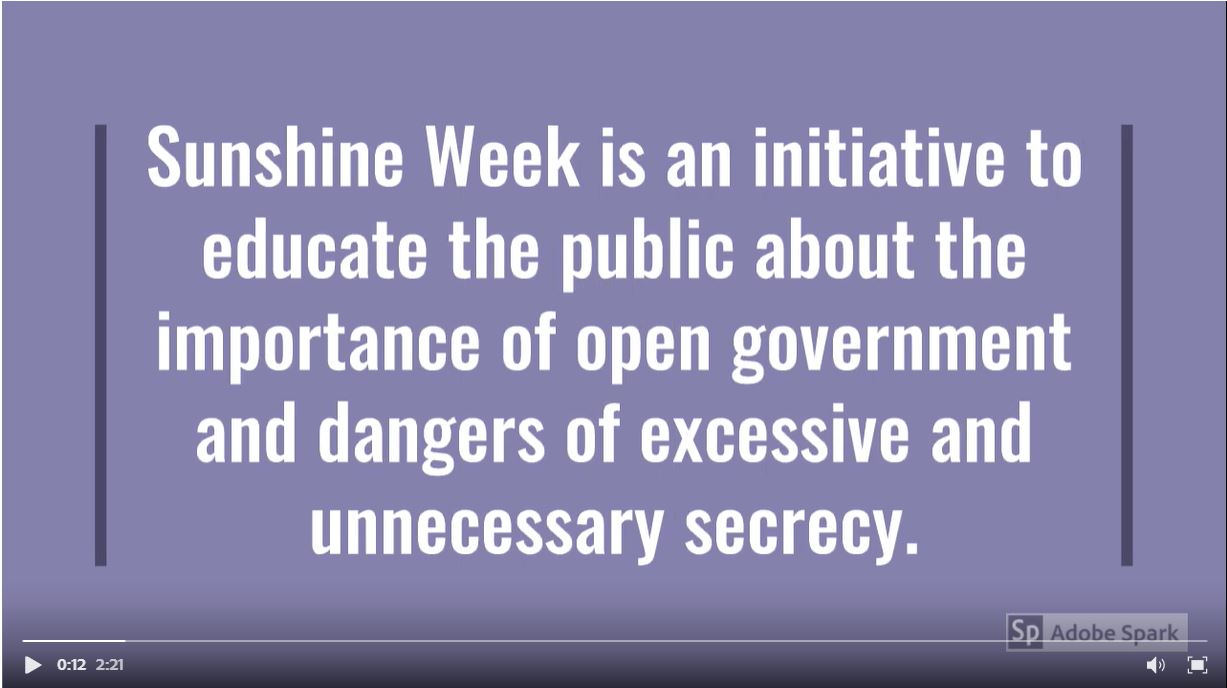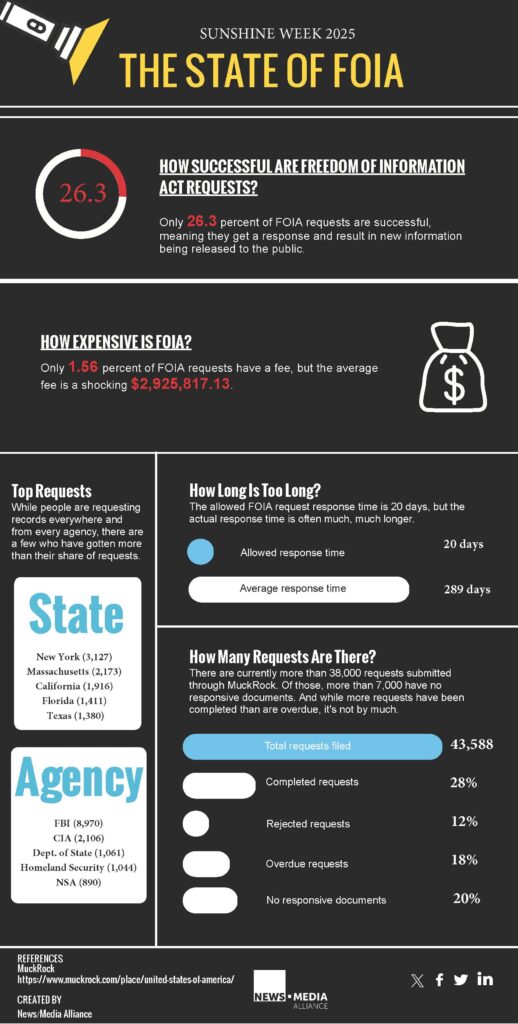|
New York News Publishers Association |
|||
Sunshine Week 2025 - March 16-22

Sunshine Week is a national initiative to promote dialogue about theimportance of open government and freedom of information. Participants include news media, civic groups, libraries, nonprofits, schools and all others interested in the public’s right to know. Sunshine Week seeks to enlighten and empower people to play an active role in their government at all levels, and to give them access to information that makes their lives better and their communities stronger.
 Click here to access a 10-part series of public service announcements in PDF format (2 columns x 6 inches) that can be used to promote Sunshine Week. A sample of one is pictured to the right. (Free for NYNPA member publications to share in print or online - all others contact Mary Miller at mmiller@nynpa.com for affordable copyright pricing).
Click here to access a 10-part series of public service announcements in PDF format (2 columns x 6 inches) that can be used to promote Sunshine Week. A sample of one is pictured to the right. (Free for NYNPA member publications to share in print or online - all others contact Mary Miller at mmiller@nynpa.com for affordable copyright pricing).
Click here to access a teaching guide including graphic organizers highlighting Freedom of Information & Sunshine Week.
Click on the image below to view a short video providing a basic summary of New York state's Freedom of Information Law (FOIL).
Click on the next image to view a short video that highlights New York State's Open Meetings Law.
As editorials and editorial cartoons become available, the content will be posted below. This content is available for all NYNPA member publications to reprint with attribution to increase public awareness of Sunshine Week and the public's right to know. All contributors should sent editorial text or cartoon images to Mary Miller at mmiller@nynpa.com.
Mark C. Mahoney, Editorial Page Editor, The Daily Gazette
|
The fight for open government doesn’t end at Sunshine WeekSunshine Week may be technically over, but the fight to hold government officials accountable continues all year long. It’s a fight waged on a daily basis in county office buildings, municipal town halls and school districts by citizens seeking their rightful access to government-held documents. It’s being waged at meetings in which citizens hold their elected officials accountable for what they say and the decisions they make. And it’s being waged in the state capitol, where citizens, good government groups, members of the media and dedicated elected officials fight for state legislation to ensure that government in New York state is as transparent and accessible to the citizens as it can be. In New York, we’re lucky to have several influential activist groups fighting for our right to know. These include Reinvent Albany, the New York Coalition for Open Government, the League of Women Voters of New York State, the Legal Aid Society, the New York Civil Liberties Union (NYCLU), the New York Public Interest Research Group (NYPIRG), the Empire Center and others. We also have state lawmakers who consistently push for transparency and who are leaders in introducing bills designed to make more information more easily available to the public and to strengthen the state’s Freedom of Information Law (FOIL) and Open Meetings Law — lawmakers like Sens. Brad Hoylman-Sigal, James Skoufis and John Liu, and Assembly members like Linda Rosenthal, John McDonald, Phil Steck, Steven Raga and Michaelle Solages, among others. Sunshine Week is when the state effort often comes together, as lawmakers focus o introduce and pass laws to improve public access. This year, lawmakers have introduced a number of important bills that support your right to know, and advocates have pushed for those and others. Among the bills prioritized by many good government groups are bills that would: require all agencies submit logs of FOIL requests to the state and for the state to post them on a single website (A2321/S0452); award reasonable attorneys’ fees in FOIL proceedings if the person is successful and to successful petitioners in cases involving the Open Meetings Law (A0950A/S1418A); require agencies to acknowledge FOIL requests and produce an approximate date, within a reasonable time frame, for the request to be approved or denied (A3425/S2520); and limit commercial FOIL exemptions by requiring entities that submit records to state agencies that are excepted from disclosure under FOIL to periodically re-apply for the exception (A1410/S5000). The Assembly showed its commitment to transparency by passing the corporate transparency bill and the FOIL activity reporting bill last week. The Senate needs to pass them now. In addition to those bills, the Assembly also passed a bill (A6707) that requires state agencies to publicly post information about contracts that were not reviewed by the state comptroller because they were either emergency contracts or exempted from review by law. We’ve pushed for lawmakers to close this loophole in the past. Let’s hope this is the year they do it. Negotiations over the state budget, which is due April 1, often overshadow efforts like these during the first half of the legislative session. It’s after the budget is approved and before the session ends in mid-June that lawmakers serious about improving the public’s right to know need to push for passage of these and other bills. While each of these bills by themselves will not fling open the doors to government, each one of them matters because it helps tilt the scales a little bit more in the citizens’ favor. While the bill sponsors are the leaders in the fight for transparency, passage still requires the support of other members of the Legislature and the governor. That’s why the public’s role in this effort is vital. Citizens need to contact their representatives and push for this legislation. That’s why we provide the bill numbers and hyperlinks to each in the online version of this editorial. If our elected officials know their constituents want them to fight for open government is important, they will make it a priority. But if they don’t hear from you, they’ll prioritize something else. Sunshine Week is the time we focus on these issues. But it is a persistent effort throughout the year that really determines how open and responsive our government becomes. As they say with all rights, if you don’t fight to keep them, you may lose them. And the right to know is a right none of us can afford to lose to complacency. |
Staff, News Media Alliance
|
The State of FOIA 2025Every year, we celebrate Sunshine Week to honor the work of the journalists and private citizens who are utilizing the Freedom of Information Act to bring government records out of the dark filing cabinets where they live and into the sunlight. The federal Freedom of Information Act and the state-level freedom of information laws make it possible for us to find out more about our government and learn about the inner workings of the organizations that keep our communities running. But as much as FOIA and the local FOIL statutes have helped us all, there is still so much work to be done. Take, for example, response times. While most FOIA requests do get a response, on the federal level, the allowed response window is 20 days, while it typically takes 289 days for requesters to get a response. And that response isn’t always records — it’s often just a note saying “We received your request and will begin to search for the records you’ve requested.” Then there are the requests that get rejected — more than 12 percent of all requests. Or the fees. While most requests don’t have fees attached, those that do can often carry a very hefty price tag. To learn more about the state of FOIA in the United States, check out our handy infographic (below), created with data provided by MuckRock. |
The Niagara-Gazette
|
Shedding light amid Trump's public records blackoutThe second go-round of a Donald Trump presidential administration has been punctuated by dramatic changes. Lost amid all the scrutiny of mass firings by Trump’s Department of Government Efficiency and other sweeping changes was a particularly troubling decision, as reported by the Poynter Institute in February, to fire federal staff responsible for responding to Freedom of Information Law requests. CNN first reported that its attempt to obtain records related to security clearances for Trump’s top aide Elon Musk through a FOIL request filed with the Office of Personal Management was met with an email that read: “Good luck with that.” It highlights Trump’s attitude toward the traditional media, a dark reminder of how he has so often cast reporters as “enemies of the people” in the past. Firing the staff responsible for fulfilling requests certainly won’t make things better at the federal level. Washington Post FOIA director Nate Jones summed the situation up best: “Anytime that whole FOIA offices are getting fired, it portends terrible things.” Terry Mutchler, an attorney and former journalist who serves as vice president of the National Freedom of Information Coalition’s board, took it a step further, saying: “I think that reporters, as is the American citizen, are in for a boatload of trouble in the next four years in this regard.” We wholeheartedly agree. We also must consider an even darker possibility — that the Trump administration’s attitude about public records requests will filter down to state and local governments. Access to records at all levels has been a key element of investigative journalism for decades. Reporters have used such information to enlighten readers and highlight corruption and problems in government to drive voters and citizens to demand change. We struggle to understand how any American — Right-leaning, Left-leaning or middle-of-the-road — can support any administration’s efforts to limit access to what should be public information. While not having FOIA officers in place certainly spells trouble, it’s important to stress that it does not relieve the federal government of its responsibility to process public records requests under timeframes prescribed by law. Reporters, editors and readers must understand that public agencies are still required, by law, to respond to formal requests for information in a timely fashion. Failure to do so can lead to court action, an often time-consuming and potentially costly step in the process that news outlets may well need to consider more often in light of current circumstances. The best defense to all of this remains one of the simplest: reminding audiences of their right — their American right — to know. Just as CNN did in its reporting on the Office of Personnel Management’s “Good Luck with that” email response to its FOIA request, all media members and news outlets must consistently inform the public whenever their government withholds what should be public information. That step in the process should also underscore how such documents often contain information about the cost of government, a cost borne by taxpayers themselves. Jones, who writes a column where he regularly documents the ups and downs of public records requests made by The Washington Post, made a great recommendation when he encouraged news outlets to “be transparent with the readership about the federal government’s failings in following the law or withholding information.” We would only add that a similar standard must also be applied to local and state reporting. “Let the public know about their losses: ‘We requested this information under FOIA. Public, don’t you think that you have the right to it?’ ” Jones told Poynter. At a time when the current administration is thumbing its nose at the media and the public’s right to know, it’s as important as ever for journalists, newspapers and news outlets to help the American public understand the difference between rhetoric and responsibility. In other words, our job is to tell them as often as necessary that there can be no America “of the people, by the people and for the people” when there is no or limited access to information about how tax money is being allocated or how public resources are being used. |
Mark C. Mahoney, Editorial Page Editor, The Daily Gazette
|
Take ownership of government. Fight for your right to knowOwnership. Most of us don’t really own a lot of the important things we think we own. Most of us have mortgages on our homes. The cars in our driveway are being paid off with bank loans. We use credit cards to buy a lot of the basic items that we “own,” paying a part of the cost now and owing more later, with interest. If you rent an apartment, you own even less, no matter how many family pictures you lay out. But there is one thing we all collectively own. 100 percent. Lock, stock and barrel: Our government. It’s ours. We paid for it. Every dollar of it. And as the owners, we have every right to know what we’re paying for and what the people we put in place to run it are doing. But that fact doesn’t stop those in government from trying to keep vital information from us. From refusing to tell us how they’re spending our money or who and what is influencing their decisions, our ownership stake doesn’t stop some public officials from withholding documents that we as the owners have a right to see. It doesn’t stop some of them from prohibiting us from knowing what they’re doing in meetings they hold outside of our view. WHY WE NEED TO KNOW The decisions they make, the motivations behind those decisions, and the records they hold are central to our lives. Government touches us all in so many ways. It’s vital that we know what’s going on all the time. It’s not just how much taxes we pay, although that’s a big part. It’s which private projects get approved or rejected — housing developments, factories, solar arrays, restaurants, cannabis shops. It’s how officials distribute state and federal funding to support sewer and water projects, bridge and road repairs, economic development. It’s which roads get resurfaced and which ones just get their potholes filled. It’s the quality of our parks and schools. It’s how clean our environment is. It’s who they hire and how many people they hire to adequately serve our needs — including employees that fill our requests for public records. We own the government. But we still have to fight to keep it. And if we don’t fight to keep it, they’ll keep fighting to take it from us. That’s the whole concept behind Sunshine Week, the week each spring promoted by the media, citizen rights organizations, good-government groups and others to ensure we the people retain all the rights of government ownership. It’s a week to remind us all that we have a right to know what our government is doing because it belongs to us. It’s a long, frustrating battle that never ends. The image from Greek mythology of King Sisyphus pushing that giant boulder up the hill, only to have it roll back down each time for eternity, comes to mind when we think of fighting for our right to know. But if we want to retain ownership of our government, we have to keep pushing. We have to make ourselves aware of our rights and learn how to use the tools we have at our disposal to exercise them. That’s what we try to do during Sunshine Week. To inform citizens of your rights and to show you how to use the tools. |
Retired editor of The Post-Star
|
Freedom of Information: It is your right. And now, your obligation.What I learned about freedom of information and open government I learned from colleagues like Mark Mahoney and Will Doolittle at The Post-Star in Glens Falls, N.Y. They knew their stuff. In 2008, Mahoney was editorial page editor at The Post-Star. I asked him to write an editorial for Sunshine Week, just as I've been tasked with doing here. "Whenever we've run articles and editorials and columns in the past on Sunshine Week to promote public awareness of open government issues, the response from the public has been a resounding thud. Nothin,'" Mahoney wrote in March 2008. "All well and good, we assumed. Obviously, you've got better things to do. Like your jobs and taking care of your children and paying the bills. We understand. But recently, with the introduction of a new `Your Right to Know blog' and a renewed push to entice people to understand the importance of free and open government, we found passion for the issue." That's what we in the journalism game are looking for again and it has never been more important. The reality is there are fewer people writing about open government - there never were a lot - than ever before. "People do care about their government operating in secret. And what we've learned over the past few weeks is that there's a group of people who've been tilting at the windmill of secrecy for years," Mahoney continued in that editorial from 17 years ago. "Their stories are shocking and discouraging. We've had people tell us how for years they've been trying to get basic information from their government, only to be ignored or turned down. They talk about acts of retribution being brought against them for daring to exercise their rights. They talk about being dismissed by state agencies and put down at meetings of their own local governments for simply asking for information." When governments do things in secret it should make you mad as hell! The question is whether you are going to take it anymore. The recent surge of citizen activism opens the portal again for citizens to master the art of freedom of information requests and know their rights regarding open meetings. It is not just important, it is essential. You can raise hell just by filing a Freedom of Information request. In 2008, as we watched the economy fall apart all around us, Mahoney was preaching the gospel of freedom of information. He wrote about local governments using confidentiality agreements to cover up financial settlements, he wrote about a local board of education that imposed a gag order on elected officials and another board that agreed to a policy that did not allow elected board of education members from viewing a classroom. In another editorial, Mahoney questioned the practice of not revealing the details of a teacher contract to the public until it was signed; a flagrant violation of Freedom of Information Law. He chastised the state comptroller's office for refusing to meet in public about the details of a local audit where there was misappropriation of funds by local officials. He called out county officials for giving the local police union a 7 percent raise in 2008 and successive 3.5 percent raises for three years in the midst of the Great Recession. Our newspaper was doing its part to shine a spotlight on the the many instances of secrecy in local government. While speaking to a former access officer at the state Department of Education, Mahoney apologized for asking so many questions about a particular records-access topic and taking up the person's time. The person's response was: "It's perfectly fine. It's your right." Never forget that. It is your right. And now, your obligation. On Pulitzer Prize Day in April 2009, Mark Mahoney was awarded the Pulitzer Prize for his Glens Falls Post-Star editorials on open government. The Washington Post and Chicago Tribune were runners-up. The citation read: In my play, The Last American Newspaper, I recount that day as the high-water mark at The Post-Star. The final editorial in Mahoney's Pulitzer entry was a step by step instruction on how to file a freedom of information request with Mahoney using the an old Chinese proverb to reason, "Give a man a fish and you feed him for a day. Teach a man to fish and you feed him for a lifetime." Our citizens, our journalists all need to get fishing. _______________________ Ken Tingley is the retired editor of The Post-Star in Glens Falls, N.Y., author of three books including The Last American Newspaper which has been adapted into a play with staged readings scheduled for Capital Repertory Theater on April 2 and the Adirondack Theater Festival in Glens Falls, July 25-27. Tingley continues to write a Substack column - The Front Page - three times a week - kentingley.substack.com. Editor's Note: To read any of Mark Mahoney's Pulitzer prize-winning editorials from 2008, connect to the Pulitzer Prized site - www.pulitzer.org/winners/mark-mahoney To see Mahoney's tips for filing a Freedom of Information request, check out this link: |
The first Daniel Ellsberg chair on government secrecy with Freedom of the Press Foundation
|
Secrecy gives the government control. FOIA can restore the power imbalanceExcessive government secrecy takes many forms, including denying or ignoring FOIA requests and deleting data from websites. These tactics prevent the public from meaningfully participating in self-government in every area secrecy touches, from domestic policy discussions on climate change, to foreign policy debates around international aid. Sunshine Week, the annual celebration of the public’s right to know, reminds us that the federal Freedom of Information Act, which allows the public to request the release of government information, is our best tool to counter this excessive secrecy and hold officials accountable. But FOIA is in trouble, and we need congressional help to fix it. Request backlogs continue to grow, and it often takes years to receive documents — if you get them at all. Delays are compounded by the fact that many FOIA offices often don’t have the resources they need to perform their jobs efficiently. To make matters worse, President Donald Trump’s administration has ordered agencies to plan for “large scale reductions in force,” which could further hobble FOIA offices, if not halt their work entirely. The challenges are steep. But we must continue our work to protect and strengthen FOIA, because when it works, it’s powerful. Here are just a few examples:
I’d argue it’s likely that the current administration knows how impactful FOIA can be, and that’s exactly why the Department of Government Efficiency is trying to hide its records from FOIA, and why FOIA staff at key agencies have been fired en masse. In spite of these challenges, the public will continue to file FOIA requests, appeals, and lawsuits to win the release of important information. But we need more help to fix FOIA’s systemic problems, especially under an administration hostile to its implementation. We must ask members of Congress, whose own access to government information may be compromised, what it's doing to ensure we all have the tools we need to scrutinize the government? |

Cartoon courtesy of Adam Zyglis, The Buffalo News
Please note: Previous Sunshine Week content is still available for download and use.
Click here to access the eight newspaper in education features created for 2012 (3 column x 8 inches) - an overview of NYS FOIL, Open Meetings, How to gain access to records and one freature on Freedom of Information and NYS Courts.
Click here to access the five-part series of features highlights just a few of the websites with reports and other data that may be of interest to students and the general public. Graphic organizers to accompany these features are also available here as PDF download. The topics included:
• What is “E-Government”? – A brief summary of our “Cyber Sunshine” focus
• Vehicle Safety – Highway Safety Data
• Food Safety – Restaurant Inspection Reports
• School Safety – Violence and Disruptive Incident Report
If you'd like to make a donation to the NYNPA Newspaper In Education program, simply press the Donation button below.
New York News Publishers Association, Inc.
Phone/Fax (518) 449-1667 - Toll-free: (800) 777-1667







